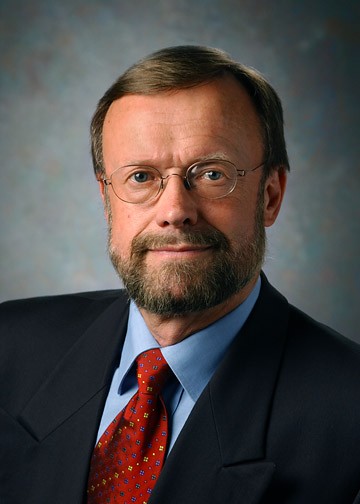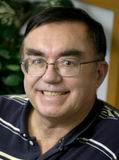|
|
                |
Keynote Speakers: Professor Wolfgang Gentzsch, Professor Geoffrey Fox
 |
Professor Wolfgang Gentzsch
DEISA Distributed European Infrastructure for Supercomputing Applications
Open Grid Forum
Germany
|
| Big Science on DEISA and PRACE - A European HPC Ecosystem |
Computational sciences have advanced dramatically, due to ever faster and better computers, numerical algorithms, and software tools. But the better the technologies we build the more demanding our scientific applications.While the need for challenging high performance computing simulations only
5 years ago was in the order of a few teraflop/s, today we see requirements from engineers and scientists approaching petaflop/s performance, with the aim to further reduce job runtime and increase accuracy and insight.
Today, the computational foundation of these scientific grand challenges are compute clusters, and grid and cloud infrastructures. Our contribution will examine these e-Infrastructures and, as two examples, present the DEISA Distributed European Infrastructure for Supercomputing Applications and the PRACE Partnership for Advanced Computing in Europe, We will describe the DEISA system architecture and the service layers, the production environment, the UNICORE access infrastructure, the distributed user management and administration, all together forming a virtual European supercomputer center.
Finally, we will present a few results from science projects successfully run on DEISA and PRACE HPC systems, and a list of lessons learned and recommendations. |
| Professor Wolfgang Gentzsch's Bio |
Prof. Wolfgang Gentzsch is Dissemination Advisor for the DEISA Distributed European Infrastructure for Supercomputing Applications, and Member at Large of the Board of Directors of the Open Grid Forum. Until recently, he was an adjunct professor of computer science at Duke University in Durham, and a visiting scientist at RENCI Renaissance Computing Institute at UNC Chapel Hill, both in North Carolina.
From 2005 to 2008, Dr. Gentzsch was the Chairman of the German D-Grid Initiative; Vice Chair of the e-Infrastructure Reflection Group e-IRG; Area Director of Major Grid Projects of the OGF Open Grid Forum Steering Group; and a member of the US President’s Council of Advisors for Science and Technology (PCAST). Before, he was Managing Director of the MCNC Grid and Data Center Services in North Carolina; Sun's Senior Director of Grid Computing in Menlo Park, CA; President, CEO, and CTO of HPC software companies Genias and Gridware, and a professor of mathematics and computer science at the University of Applied Sciences in Regensburg, Germany.
Wolfgang Gentzsch studied mathematics and physics at the Technical Universities in Aachen and Darmstadt, Germany. |
 |
Professor Geoffrey Charles Fox
School of Informatics and Computing
Community Grids Laboratory
Indiana University Bloomington
USA
|
| HPCC with Grids and Clouds |
We discuss the impact of clouds and grid technology on HPCC using examples from a variety of fields -- especially the life sciences. We cover the impact of the growing importance of data analysis and note that it is more suitable for these modern architectures than the large simulations (particle dynamics and partial differential equation solution) that are mainstream use of large scale "massively parallel" supercomputers. The importance of grids is seen in the support of distributed data collection and archiving while clouds should replace grids for the large scale analysis of the data.
We discuss the structure of applications that will run on current clouds and use either the basic "on-demand" computing paradigm or higher level frameworks based on MapReduce and its extensions. Current MapReduce implementations run well on algorithms that are a "Map" followed by a "Reduce" but perform poorly on algorithms that iterate over many such phases. Several important algorithms including parallel linear algebra falls into latter class. One can define MapReduce extensions to accommodate iterative map and reduce but these have less fault tolerance than basic MapReduce. Both clouds and exascale computing suggest research into a new generation of run times that lie between MapReduce and MPI and trade-off performance, fault-tolerance and asynchronicity.
We conclude with a description of FutureGrid -- a TeraGrid system for prototyping new middleware and applications.
|
| Professor Geoffrey Charles Fox's Bio |
Fox received a Ph.D. in Theoretical Physics from Cambridge University and is now professor of Informatics and Computing, and Physics at Indiana University where he is director of the Digital Science Center and Associate Dean for Research and Graduate Studies at the School of Informatics and Computing. He previously held positions at Caltech, Syracuse University and Florida State University. He has supervised the PhD of 61 students and published over 600 papers in physics and computer science. He currently works in applying computer science to Bioinformatics, Defense, Earthquake and Ice-sheet Science, Particle Physics and Chemical Informatics. He is principal investigator of FutureGrid – a new facility to enable development of new approaches to computing. He is involved in several projects to enhance the capabilities of Minority Serving Institutions. |
|
|